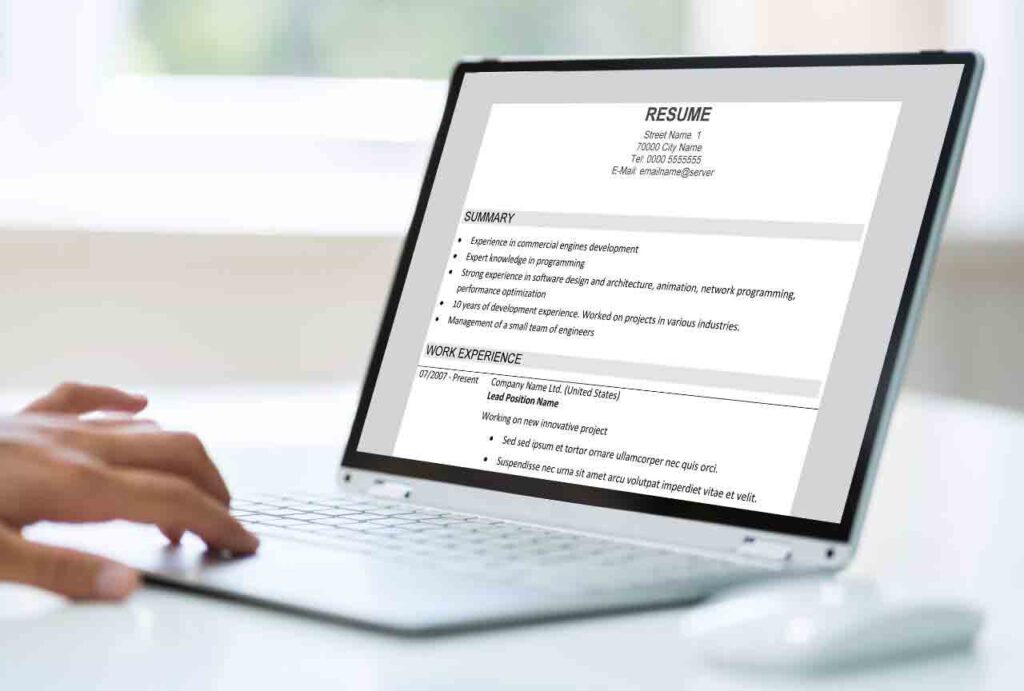Crafting a compelling resume is one of the most critical steps in a successful job search. Your resume is often the first impression you make on potential employers, and it can significantly impact whether you progress to the next stage of the hiring process. Unfortunately, many job seekers unintentionally make mistakes that can reduce their chances of standing out in a competitive job market.
This article will guide you through 10 essential resume do’s and don’ts, highlighting common errors and the actionable steps to avoid them. By following these practical tips, you can create a resume that effectively showcases your skills and experiences, increasing your chances of catching the attention of hiring managers.
I. Common Resume Mistakes and How to Fix Them
Mistake 1: Using Generic Templates
Don’t use the first template you see in search engines. Many job seekers rely on basic resume templates available online, assuming that any format will work. These generic designs often fail to showcase individuality or align with the industry standards of the desired role.
- Why This Is a Problem: Recruiters and hiring managers see hundreds of resumes, and generic templates make it difficult for your application to stand out. Additionally, these templates may not be optimized for applicant tracking systems (ATS), which are widely used to filter resumes before human review.
- What to Do Instead: Select a clean, professional design that reflects the industry while maintaining readability. Focus on simplicity, clear fonts, and logical formatting. Tailor the structure to emphasize your strengths, and ensure compatibility with ATS by avoiding overly complex elements like graphics or tables.
Mistake 2: Including Irrelevant Information
Adding unnecessary details, such as outdated experience or unrelated hobbies, can clutter your resume and distract from your qualifications.
- Why This Is a Problem: Hiring managers have limited time to review each resume, and irrelevant information can make it harder for them to identify your value. Including unrelated details can also suggest a lack of focus or understanding of the role.
- What to Do Instead: Customize your resume for each application by including only the information relevant to the position. Highlight roles, skills, and achievements that align with the job description. Leave out hobbies, personal details like marital status, and work experience that does not contribute to the narrative of your qualifications.
Mistake 3: Spelling and Grammar Errors
Errors in spelling, grammar, or punctuation can leave a negative impression on hiring managers. They may perceive these mistakes as a sign of carelessness or poor attention to detail.
- Why This Is a Problem: A resume riddled with errors reflects poorly on your professionalism and can quickly disqualify your application. Hiring managers may view these mistakes as an indication of how you would approach your work responsibilities.
- What to Do Instead: Proofread your resume multiple times to catch errors. Use free grammar-checking tools like QuillBot, but also have a trusted friend or mentor review it for additional feedback. Reading your resume aloud can also help identify awkward phrasing or overlooked mistakes.
Mistake 4: Overloading with Buzzwords
It’s tempting to use phrases like “team player,” “hard worker,” or “results-driven” to describe yourself. However, overusing these buzzwords without supporting evidence can make your resume sound generic and unconvincing.
- Why This Is a Problem: Buzzwords without context or examples do not provide a clear picture of your capabilities. Recruiters look for tangible achievements rather than vague self-descriptions.
- What to Do Instead: Replace generic terms with specific accomplishments and results. Use measurable outcomes, such as “Managed a team of 10 to increase revenue by 15%” or “Reduced project turnaround time by 20% through process optimization.” This demonstrates your value through concrete achievements rather than empty claims.
Mistake 5: Ignoring Keywords
Failing to incorporate relevant keywords from the job description can prevent your resume from passing ATS scans, which are often the first step in the hiring process.
- Why This Is a Problem: Many companies use ATS software to filter applications, and resumes that lack specific keywords may never reach a hiring manager. Even if your skills align with the role, not using the right terminology can limit your chances.
- What to Do Instead: Study the job description carefully and identify the key skills, certifications, and terms mentioned. Include these keywords into your resume, particularly in the skills, experience, and summary sections. However, avoid stuffing keywords unnaturally, as it can make your resume difficult to read.

Also Read: 10 Secrets HR Reveals About Job Candidates (You Need to Know)
II. What to Avoid in Resumes
Crafting a professional resume involves more than just knowing what to include; it also requires an understanding of what to leave out. Avoiding these common resume mistakes ensures your application remains polished, focused, and aligned with employer expectations.
6. Using Unprofessional Contact Information:
Your email address and phone number are essential elements of your resume, but unprofessional contact details can negatively impact your credibility.
- Why This Is a Problem: Email addresses or usernames that include nicknames, numbers, or informal language can appear unprofessional and may not be taken seriously by recruiters. Employers may question your attention to detail and professionalism based on this oversight.
- What to Do Instead: Use an email address that incorporates your first and last name, or a variation that looks professional, such as “[email protected].” Avoid using workplace email addresses, as this can suggest poor judgment. Double-check your phone number for accuracy and ensure your voicemail greeting is professional.
7. Listing References Directly on Your Resume:
Including a list of references or the phrase “References available upon request” is outdated and unnecessary.
- Why This Is a Problem: References are typically requested later in the hiring process, so including them on your resume takes up valuable space that could be used to highlight your skills and achievements. Additionally, this information is irrelevant at the initial application stage.
- What to Do Instead: Leave reference details off your resume. If a prospective employer requests them, provide a separate document with up-to-date and relevant contact information for your references. Focus your resume on presenting your qualifications and accomplishments.
8. Exaggerating or Providing False Information:
While it may be tempting to enhance your qualifications or experience, inaccuracies on a resume can lead to serious consequences if discovered.
- Why This Is a Problem: Employers often conduct background checks and verify credentials during the hiring process. If discrepancies are found, it can lead to disqualification, damage your reputation, and hinder future opportunities.
- What to Do Instead: Be honest about your skills, experience, and achievements. If there are gaps in your qualifications, focus on transferable skills, professional development, or certifications that demonstrate your ability to succeed in the role. Highlighting your potential and honesty will build trust with employers.
9. Including Photos Unless Specifically Required:
Photos on resumes are discouraged in most industries unless explicitly requested in the job description.
- Why This Is a Problem: Including a photo can invite unconscious bias or distract recruiters from evaluating your qualifications objectively. It can also take up valuable space that could be better used to emphasize your skills and achievements.
- What to Do Instead: Focus on crafting a content-rich resume that highlights your abilities, achievements, and relevance to the role. Only include a photo if it is a standard practice in your industry or specifically required, such as for certain roles in modeling or acting.
10. Making the Resume Too Long:
While it’s important to provide enough detail to demonstrate your qualifications, an overly lengthy resume can overwhelm recruiters and lead to disinterest.
- Why This Is a Problem: Hiring managers typically spend only a few seconds reviewing each resume. A long document with excessive information can make it harder for them to quickly identify your strengths and suitability for the role.
- What to Do Instead: Keep your resume concise and targeted. Early-career professionals should limit their resumes to one page, while experienced candidates can extend to two pages if necessary. Focus on recent, relevant experiences and use bullet points to organize information clearly. Avoid lengthy paragraphs and redundant details.
By avoiding these common pitfalls and implementing best practices, you can showcase your qualifications effectively and leave a positive impression on hiring managers. A well-structured and polished resume not only reflects your professionalism but also significantly increases your chances of landing your desired role. Take the time to refine your resume, and you’ll set yourself apart as a strong candidate.



